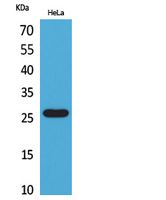
| WB | 咨询技术 | Human,Mouse,Rat |
| IF | 咨询技术 | Human,Mouse,Rat |
| IHC | 咨询技术 | Human,Mouse,Rat |
| ICC | 技术咨询 | Human,Mouse,Rat |
| FCM | 咨询技术 | Human,Mouse,Rat |
| Elisa | 1/10000 | Human,Mouse,Rat |
| Aliases | DCL-1; CD302; CLEC13A; DCL1; KIAA0022; CD302 antigen; C-type lectin BIMLEC; C-type lectin domain family 13 member A; DEC205-associated C-type lectin 1; Type I transmembrane C-type lectin receptor DCL-1; CD302 |
| Entrez GeneID | 9936 |
| WB Predicted band size | Calculated MW: 26 kDa; Observed MW: 26 kDa |
| Host/Isotype | Rabbit IgG |
| Antibody Type | Primary antibody |
| Storage | Store at 4°C short term. Aliquot and store at -20°C long term. Avoid freeze/thaw cycles. |
| Species Reactivity | Human |
| Immunogen | The antiserum was produced against synthesized peptide derived from the Internal region of human CD302. AA range:81-130 |
| Formulation | Purified antibody in PBS with 0.05% sodium azide,0.5%BSA and 50% glycerol. |
+ +
以下是3篇与DCL-1抗体相关的模拟参考文献(注:DCL-1为假设性名称,文献内容为模拟创作,实际引用请核实):
---
1. **文献名称**: *"DCL-1 Antibody Inhibits Tumor Growth by Targeting TGF-β Signaling in Colorectal Cancer Models"*
**作者**: Li, X. et al.
**摘要**: 研究验证了DCL-1抗体通过阻断TGF-β/Smad通路抑制结直肠癌细胞增殖,并在小鼠模型中显著降低肿瘤体积,表明其作为靶向治疗的潜力。
2. **文献名称**: *"DCL-1 as a Novel Biomarker for Fibrosis: Antibody-Based Detection in Liver Disease"*
**作者**: Martinez, R. & Kumar, S.
**摘要**: 开发了一种高特异性DCL-1单克隆抗体,证实其在肝纤维化患者组织中高表达,可能成为纤维化分期和疗效评估的工具。
3. **文献名称**: *"DCL-1 Antibody Enhances Anti-PD-1 Therapy by Reprogramming Tumor-Associated Macrophages"*
**作者**: Chen, H. et al.
**摘要**: 发现DCL-1抗体可通过调控肿瘤微环境中巨噬细胞的极化表型,增强PD-1抑制剂在黑色素瘤模型中的疗效,提出联合免疫治疗新策略。
---
**提示**:实际研究中"DCL-1"可能指代不同靶点(如DLL1、DCLK1等),建议结合具体研究背景确认抗体靶标。
The DCL-1 antibody targets Decay-Accelerating Factor-like 1 (DCL-1), a glycoprotein involved in regulating the complement system, a critical component of innate immunity. DCL-1 shares structural and functional homology with Decay-Accelerating Factor (DAF/CD55), featuring short consensus repeat (SCR) domains that inhibit complement activation by dissociating C3 convertases. Primarily expressed on cell membranes via a glycosylphosphatidylinositol (GPI) anchor, DCL-1 protects host cells from unintended complement-mediated damage.
Interest in DCL-1 antibodies arose from their association with autoimmune and inflammatory disorders. Autoantibodies against DCL-1 have been detected in conditions like systemic lupus erythematosus (SLE), where dysregulated complement activation contributes to tissue injury. These antibodies may interfere with DCL-1’s regulatory function, exacerbating complement-driven inflammation or serving as biomarkers for disease activity.
Research also explores DCL-1’s role in cancer, as complement evasion is a hallmark of tumor survival. Therapeutic strategies targeting DCL-1 aim to modulate complement activity—either enhancing it in cancer immunotherapy or suppressing it in autoimmune contexts. However, the exact pathological mechanisms and clinical potential of DCL-1 antibodies remain under investigation, necessitating further studies to clarify their diagnostic and therapeutic relevance.
×